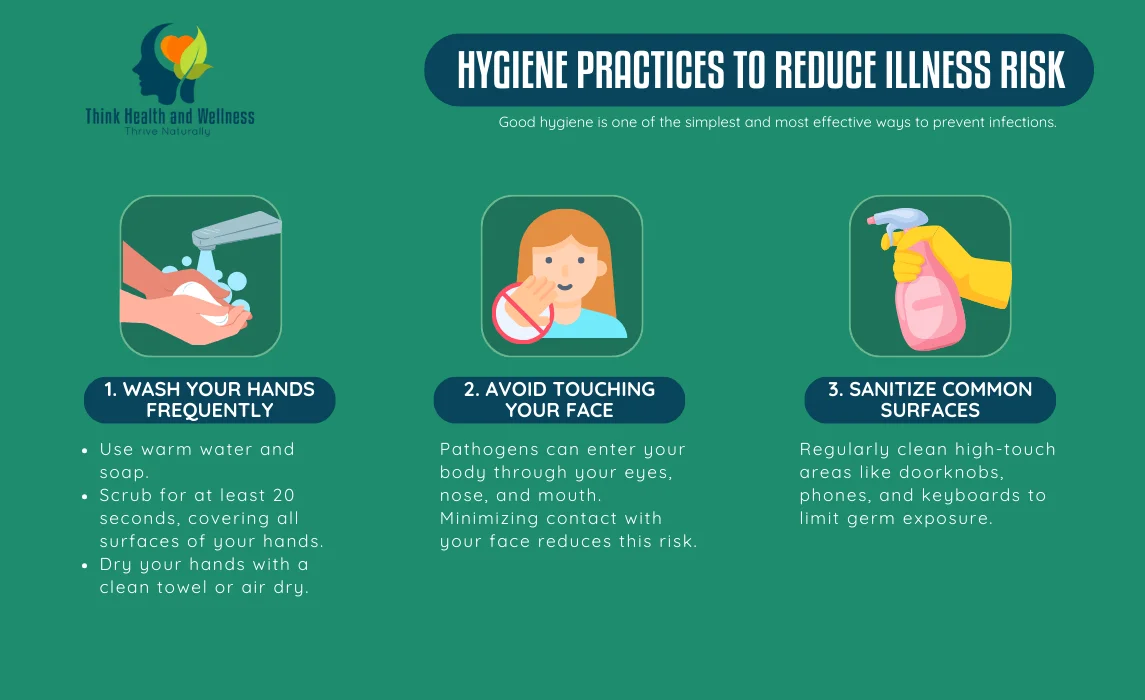How to Boost Your Immune System for Winter: Immune-Boosting Tips to Stay Healthy During Cold and Flu Season

Yes—finger plays, clapping games, and dance routines that use hand gestures all help. Combine rhythm and repetition for deeper learning.
Send home simple activity ideas, kits, or worksheets. Offer short instructions and encourage family involvement. Regular practice builds lasting progress.
Try origami, sticker scenes, stringing pasta, or painting with Q-tips. Crafts that use small pieces build precision and control.

As the temperatures drop, winter ushers in the cold and flu season, a time when our bodies are more susceptible to illness. Strengthening your immune system is essential to ward off infections like the flu, common cold, and other seasonal viruses. Thankfully, there are many ways to boost your immune system, from embracing a healthy lifestyle to incorporating nutrient-rich foods and supplements. In this comprehensive guide, we’ll explore every aspect of preparing your body for the winter months, so you can stay healthy and vibrant all season long.
Understanding the Immune System: Your Body's Defense Mechanism
Your immune system is a complex network of cells, tissues, and organs designed to protect your body from harmful invaders like bacteria, viruses, and toxins. It operates as your body’s first line of defense, identifying and neutralizing threats before they cause harm.
Key components of the immune system include:
- White Blood Cells: These cells attack pathogens and play a central role in fighting infections.
- Antibodies: Proteins that recognize and neutralize specific invaders.
- Lymphatic System: A network of tissues and organs that transport immune cells throughout the body.
Maintaining a healthy immune system ensures your body can respond quickly to infections, reducing the severity of illnesses like the common cold or flu. However, several factors—like poor diet, stress, and lack of sleep—can compromise your immune function.
Why Winter Challenges Your Immune System

During the cold and flu season, our immunity faces several challenges, including:
- Close Contact Indoors: Spending more time indoors increases exposure to airborne germs and viruses.
- Dry Air: Indoor heating systems dry out the air, which can dehydrate mucous membranes, reducing their ability to trap pathogens.
- Limited Sunlight: Reduced sunlight exposure lowers vitamin D levels, which are crucial for a healthy immune response.
- Seasonal Viruses: Cold weather creates conditions conducive to the spread of cold and flu viruses, such as influenza.
Understanding these challenges highlights why it’s so important to adopt immune-boosting strategies during winter.
How to Boost Your Immune System Naturally

1. Focus on a Nutrient-Rich Diet
Your diet plays a vital role in maintaining a strong immune system. Eating a variety of foods ensures you get the vitamins and minerals your body needs to fight off infections.
Key Immune-Boosting Nutrients:
- Vitamin C: Found in citrus fruits, bell peppers, broccoli, and strawberries, this vitamin supports white blood cell production and reduces the duration of colds.
- Zinc: Essential for wound healing and immune cell function. Foods rich in zinc include oysters, nuts, seeds, beans, and lentils.
- Selenium: Found in Brazil nuts, seafood, and eggs, selenium helps protect against cell damage and boosts the body's ability to fight viruses.
- Vitamin D: Found in fortified foods, fatty fish, and egg yolks, or synthesized through sunlight exposure, this vitamin regulates immune responses.
- Probiotics: Foods like yogurt, kefir, kimchi, and sauerkraut support gut health, which is closely linked to immunity.
Sample Immune-Boosting Meals:
- Breakfast: Greek yogurt with fresh fruit, chia seeds, and a drizzle of honey.
- Lunch: Spinach and chickpea salad with lemon vinaigrette.
- Dinner: Grilled salmon with steamed broccoli and quinoa.
A healthy diet full of fresh produce and minimally processed foods ensures your immune system has the nutrients it needs to function optimally.
2. Prioritize Quality Sleep
Sleep is critical for maintaining a robust immune system. During sleep, your body produces cytokines—proteins that help combat infections and inflammation. Sleep deprivation can reduce cytokine production, leaving you more vulnerable to illness.
Tips for Better Sleep:
- Maintain a consistent sleep schedule, even on weekends.
- Create a calming bedtime routine, such as reading or meditating.
- Limit caffeine and screen time in the evening.
Adults should aim for 7–9 hours of sleep per night. If you struggle with sleep, consult a healthcare provider for additional support.
3. Stay Physically Active
Regular exercise is an excellent way to boost your immune system. Moderate physical activity enhances circulation, which allows immune cells to travel more efficiently throughout your body. Exercise also reduces stress hormones, improving overall immune function.
Suggested Activities:
- Brisk walking for 30 minutes a day.
- Yoga or pilates for stress relief and flexibility.
- Strength training to build endurance and muscle.
Avoid overtraining, as intense exercise without proper recovery can weaken your immunity.
4. Manage Stress Effectively
Chronic stress elevates cortisol levels, which suppresses the immune system over time. Incorporating stress-reduction techniques into your routine can significantly improve your body’s ability to fight infections.
Stress-Reduction Techniques:
- Meditation: Spend 10–15 minutes a day focusing on your breath.
- Journaling: Write down thoughts and feelings to process emotions.
- Hobbies: Engage in activities you enjoy, such as cooking or gardening.
Lowering stress levels helps your immune system work more effectively, especially during the flu season.
5. Stay Hydrated
Proper hydration supports all bodily functions, including immune health. Water helps flush toxins from your body and keeps mucous membranes moist, which enhances their ability to trap pathogens.
Hydration Tips:
- Aim to drink at least 8 glasses of water daily.
- Include herbal teas, such as chamomile or echinacea, which may have additional immune-boosting properties.
- Limit dehydrating beverages like alcohol and caffeinated drinks.
The Role of Vitamins and Supplements
For some, getting all the necessary nutrients from food alone can be challenging. Supplements can fill nutritional gaps and enhance immunity.
Common Immune-Boosting Supplements:
- Vitamin C: Can shorten the duration of colds.
- Vitamin D: Supports immune cell activity.
- Zinc: Reduces the severity of cold symptoms.
- Probiotics: Promotes a healthy gut microbiome.
It’s important to remember to consult your doctor before starting any supplement, especially if you take medications or have underlying conditions.
Hygiene Practices to Reduce Illness Risk

Good hygiene is one of the simplest and most effective ways to prevent infections.
1. Wash Your Hands Frequently
- Use warm water and soap.
- Scrub for at least 20 seconds, covering all surfaces of your hands.
- Dry your hands with a clean towel or air dry.
2. Avoid Touching Your Face
Pathogens can enter your body through your eyes, nose, and mouth. Minimizing contact with your face reduces this risk.
3. Sanitize Common Surfaces
Regularly clean high-touch areas like doorknobs, phones, and keyboards to limit germ exposure.
Vaccination: A Crucial Step in Immune Protection
Vaccines are essential tools for preventing severe illnesses during the flu season. They work by introducing a small, harmless part of a virus or bacteria to your immune system, training it to recognize and fight the real pathogen.
Flu Vaccine Benefits:
- Reduces the risk of flu-related hospitalization.
- Protects vulnerable populations like the elderly and those with chronic illnesses.
- Contributes to herd immunity, protecting those who cannot be vaccinated.
The flu shot is particularly important for individuals over 65, young children, and those with weakened immunity.
Immune-Boosting Foods to Include in Your Winter Diet
1. Garlic

Garlic has natural antimicrobial and antiviral properties, making it a powerful ally against infections.
2. Citrus Fruits

Oranges, grapefruits, and lemons are high in vitamin C, which supports immune cell function.
3. Chicken Soup

A classic remedy, chicken soup provides hydration, warmth, and essential nutrients that soothe cold symptoms.
4. Nuts and Seeds

Packed with zinc, selenium, and healthy fats, these snacks are easy to incorporate into meals.
5. Fermented Foods

Probiotic-rich foods like yogurt and kimchi promote a healthy gut, which is central to immunity.
You May Also Like: How to Mouth Tape: Get the Facts on This Nighttime Breathing Hack
Protecting Vulnerable Populations During Flu Season
Elderly Adults
- Ensure they get vaccinated against the flu and pneumonia.
- Encourage a diet rich in immune-boosting nutrients.
Children
- Teach them proper handwashing techniques.
- Provide a variety of fruits and vegetables to support growth and immunity.
You May Also Like: Unlocking the Health Benefits of Cold Showers
Frequently Asked Questions and Answers
1. How can I naturally boost my immune system for winter?
To naturally boost your immune system, focus on a balanced diet rich in immune-boosting vitamins and minerals, like vitamin C, vitamin D, zinc, and selenium. Prioritize sleep, stay hydrated, reduce stress, exercise regularly, and practice good hygiene. These healthy lifestyle habits strengthen your immune system’s ability to fight off viruses and bacteria, making you less likely to get sick during the winter months.
2. What are some foods that help strengthen my immune system?
Several immune-boosting foods can support your body’s defense system, including:
- Citrus fruits like oranges, lemons, and grapefruits, which are high in vitamin C.
- Garlic, known for its antimicrobial and antiviral properties.
- Leafy greens and vegetables, rich in essential vitamins and minerals.
- Nuts and seeds like almonds, sunflower seeds, and Brazil nuts, which provide zinc and selenium.
- Probiotic-rich foods such as yogurt, kefir, and fermented vegetables to support gut health.
Incorporating these into your diet will provide the nutrients needed to boost your immune system effectively.
3. How much sleep do I need to boost my immune system?
Getting enough sleep is crucial for a healthy immune system. Aim for 7-9 hours of quality sleep per night. During sleep, your body produces essential cytokines that help fight infections. A lack of sleep can compromise your immune response, making you more vulnerable to colds and flu.
If you're struggling with sleep, consider establishing a calming bedtime routine and reducing screen time before bed.
4. Does exercise help boost my immune system?
Yes, regular moderate exercise can enhance immune function by increasing circulation, which helps immune cells travel efficiently through your body. It also reduces stress hormones, which can suppress immunity when elevated for prolonged periods. Aim for 30 minutes of exercise most days, such as walking, yoga, or cycling.
However, avoid overtraining, as excessive physical stress can weaken your immune system.
5. Are there any supplements that can help boost my immune system?
Supplements can be beneficial, especially if you're not getting enough immune-boosting nutrients from food. Common immune-boosting supplements include:
- Vitamin C: Helps support immune function and can reduce the duration of colds.
- Vitamin D: Essential for immune cell activity and often deficient in winter.
- Zinc: Reduces the severity of cold symptoms and promotes healing.
- Probiotics: Help maintain a healthy gut microbiome, which is linked to immune health.
Before taking supplements, it’s always a good idea to consult a healthcare provider to ensure they are appropriate for your individual needs.
You May Also Like: How to Cook Cauliflower Rice: A Simple Cauliflower Rice Recipe to Make Cauliflower Rice Perfectly Every Time




